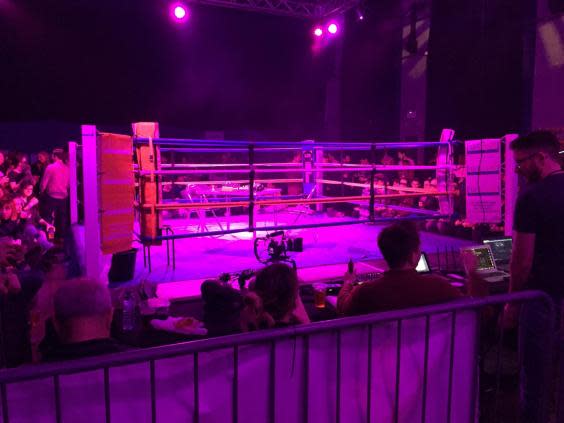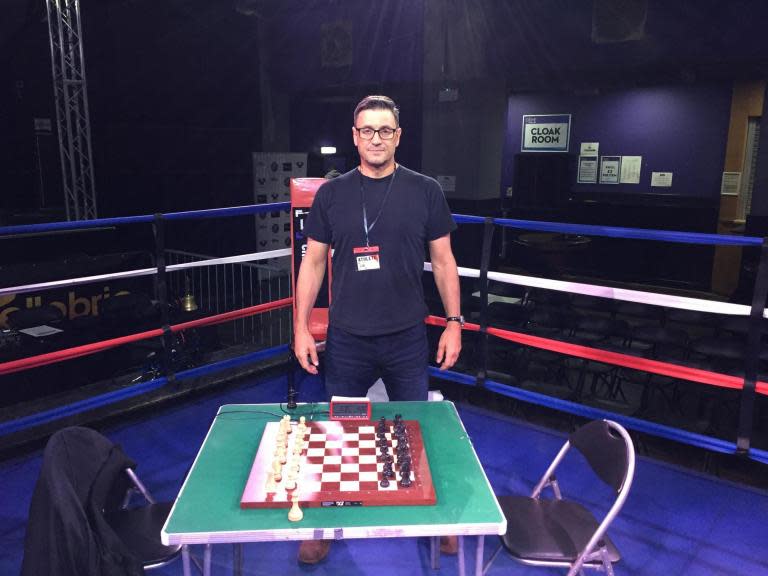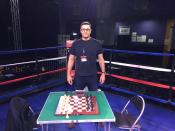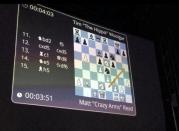Welcome to chessboxing, the ultimate battle of physical and mental prowess
As the bell rings, the first bout of the evening begins in cagey fashion. Both fighters gently probe for the centre ground but remain solid in defence to ensure no fatal mistake is made early on. As this happens, nobody is looking at the ring, but at a smartboard displayed above the stage towards the back of the Dome at Tufnell Park, London. This is because the ropes, corners and gloves are redundant for now. The combat isn’t taking place on the canvas of the ring, but instead on the chequered floor of a chess board.
The smartboard displays a live feed of the location of every piece on the board. As soon as a pawn jumps forward a square, the sold out audience can see it happen live via the feed. Meanwhile, Tim ‘The Hippo’ Woolgar positions his queen and bishop on his opponent’s king side, looking to lay the foundations for a future attack. Tim’s up against Matt ‘Crazy Arms’ Read, the most experienced fighter in the sport. That experience shows when he secures the first capture of the game before the second ringing of the bell ends the round.
The headphones, worn for soundproofing during the chess rounds, are taken off and suddenly crew climb into the ring and remove the board. The chairs and table are gone, and now Tim and Matt have returned to the ring sporting gloves and gum shields. The bell starts the second round, and with that castling has been swapped for footwork, pawn capturing for chin striking, chess for boxing.
Tim isn’t just a competitor. He founded London Chessboxing after a career as a video journalist working with the BBC. He’s played chess since he was seven years old and took up boxing in his teens. He saw an advert for a chessboxing event in Berlin that immediately caught his attention. He went and saw something he desperately wanted to get involved in, so came back to found his own organisation here in England.
“I fell in love with it instantly,” Tim tells The Independent. “Everyone in the room had a good night, and I thought ‘I want to have a chessboxing match’. So I did. It generated a lot of interest. I put out press releases, it was picked up, then suddenly it was on national news. After that we did more shows and it sold out.”
A typical fight consists of six chess rounds and five boxing. A win is secured via checkmate, knockout or on points based on the chess performance, or if one player runs out of time to make a move in the chess. If you thought audiences just come to wait patiently for the fist throwing, you’re mistaken. On many occasions the sound of landed punches were drowned out by the choruses of “chess ,chess, chess, chess”. Signs held by spectators display phrases such as “ruin his knight” and “en passant his lights out”. The reception flirts with irony at times, but chess in this environment is as much a spectacle as the boxing in the eyes of the crowd.
“It’s got its own unique magic,” Tim continues. “It’s a dramatic sport so you really feel for someone who’s got blood dripping down their nose and suddenly has to sit down and think strategically. Or when you can see someone’s got a naked king on the board and facing checkmate, and has to stop his opponent in the next boxing round. The stakes are played out very dramatically.”

That’s no exaggeration. Tim and Matt are friends outside of the ring, but that doesn’t prevent an absolute slugfest ensuing in the second round. Both land substantial shots, with Matt using his reach to compensate for his slimmer frame. The bell concludes the second and the two competitors reciprocate a friendly fist bump. The fighters share changing rooms and equipment. It’s clear the niche nature of the sport has created a tight-knit community built on friendship and respect.
Seeing someone like Matt, who is editor of Chess Magazine, hold his own with the gloves on shows the sport is a place where stereotypes go to die. Tim tells me this is what he loves about the sport, that a chess specialist can come in and defy the odds in the ring, or a boxer can come in and learn a completely new skill.
The action in the ring has been electric as the night heads into the final bout of the evening. This one is a grudge match involving Brit Richard Frazer, and Italian Daniele Giulio Rota, who went into the fight putting his championship on the line.
Frazer says his friends think he’s crazy for competing in the sport, but it’s an adrenaline rush like no other. Frazer’s last fight was against tonight’s opponent. He had planned to retire after the bout, until he was checkmated in the first round. Unable to depart from the sport on such catastrophic terms he returned to take on the Italian once more.

“It didn’t quite go as I’d hoped,” Frazer says with a chuckle. “It was supposed to be my retirement fight. I’d trained for two months, I’d invited my friends and family. It was supposed to be my last hurrah, and then I was checkmated in the first round having not thrown a punch. I got a call asking if I wanted to fight tonight, and I thought this is some unfinished business, so I accepted."
Rota takes control of the chessboard in the first round, stripping his opponent of one of his knight pieces, but Frazer keeps his king safe at the back of the board to ensure he doesn’t repeat the catastrophe in the last fight. Then, the second round epitomises the appeal of chessboxing. He comes out flying, landing heavy blows to Rota who seems happy to defend his control in the chess.
Later in the bout though, Frazer is punished for his lack of control on the chess board. As he grows more vulnerable he is forced to take more time to plan his next move, but time runs out. Rota takes victory but Frazer seems content with his effort. Every fight on the night was decided on the chessboard, but each round of boxing was pulsating.
The transition between chess and boxing appears to be a binary separation of physical and mental ability. However, it’s impossible to deny the importance of strategy when throwing a jab, and it’s impossible to not admire the composed strategy of man mentally outwitting his opposite number having just had his cranium jostled by a right hook. The two disciplines are as much the same as they are polar opposites. A poetic ying and yang of sporting prowess. Or as Richard Frazer’s friends and family put it: “Mental.”
You can buy a ticket at www.londonchessboxing.com or watch online at https://www.twitch.tv/londonchessboxing






